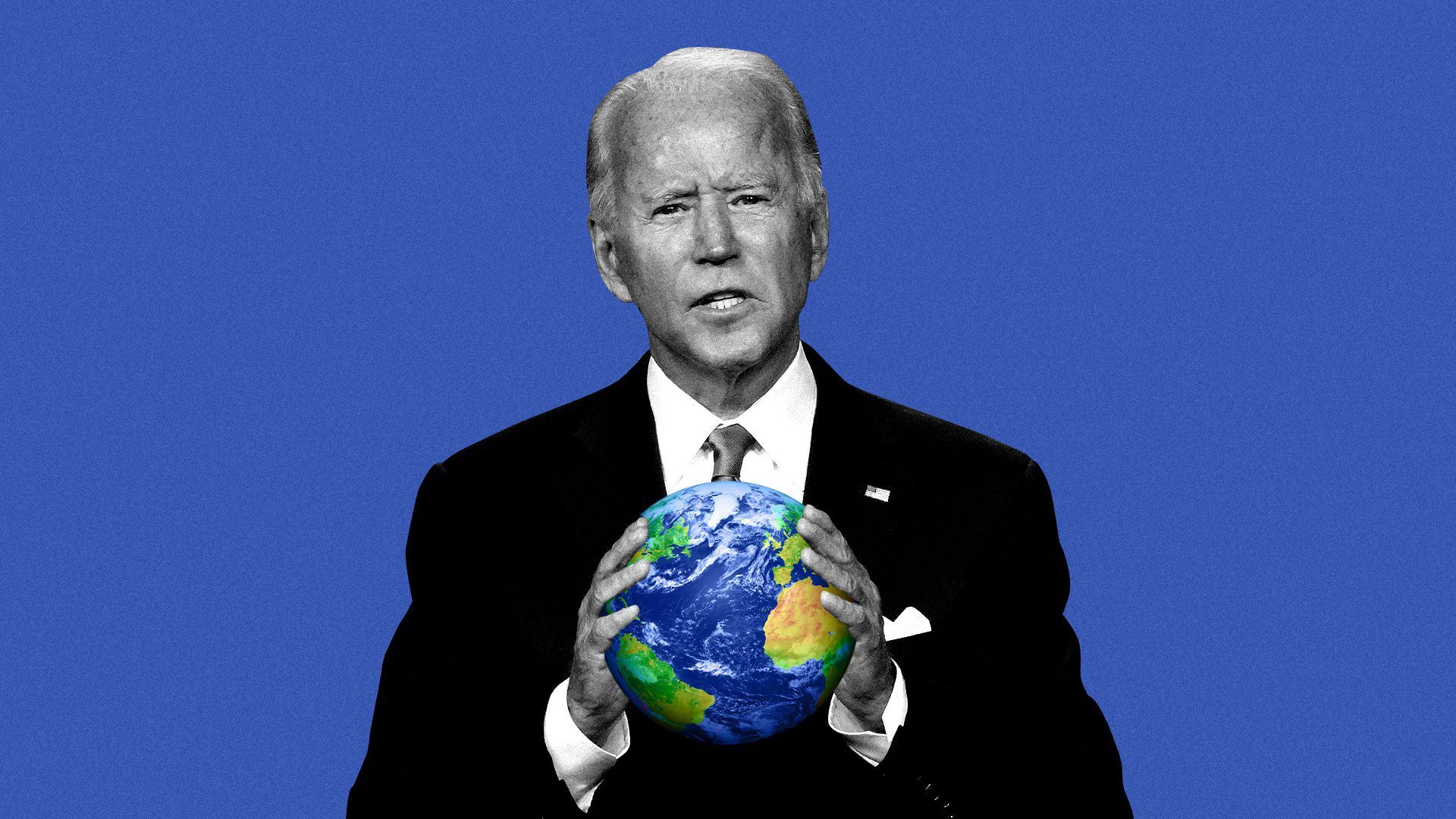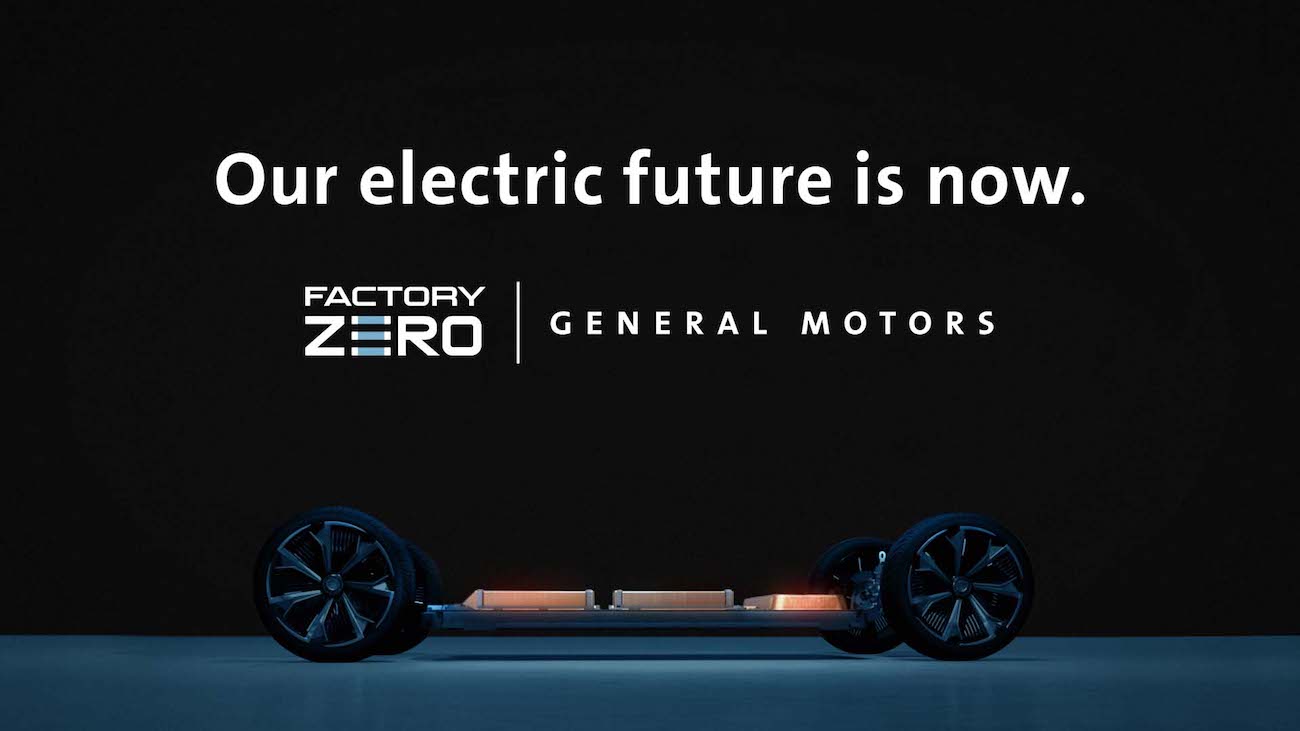| |
| |
| |
| Presented By General Motors |
| |
| Generate |
| By Ben Geman ·Nov 24, 2020 |
| Welcome back! Today's Smart Brevity count: 1,255 words, < 5 minutes 🚨Situational awareness: "Oil hit its highest since in March on Tuesday, rising towards $47 a barrel, as a third promising coronavirus vaccine spurred demand recovery hopes and U.S. President-elect Joe Biden received the go-ahead to begin his transition." (Reuters) 🎸And this weekend will mark 40 years since The Jam released "Sound Affects," which provides today's intro tune... |
| |
| |
| 1 big thing: Biden's emerging climate orbit |
 |
|
| Photo illustration: Aïda Amer/Axios. Photo: Win McNamee/Getty Images |
| |
| As of this morning we know a lot more about President-elect Joe Biden climate personnel orbit, even as picks for agencies like EPA and DOE are outstanding, so here are a few early conclusions. Why it matters: They're the highest-level names yet announced who will have a role in what Biden is promising will be a far-reaching climate and energy agenda. Catch up fast: Biden's team yesterday either announced or sources indicated his choices, which include... - Former Secretary of State John Kerry will be his full-time special climate envoy.
- Biden will select a separate, "high level" White House climate policy coordinator next month.
- Biden plans nominate former Fed chair Janet Yellen as his Treasury secretary.
- Antony Blinken will be the nominee for secretary of state.
The big picture: Here are a few takeaways... 1. Biden is sending early signals that climate change is a priority. Kerry is the highest-profile selection yet for his government (h/t NYT on that point). And Biden's team says he'll have influence via a seat on the National Security Council. - It's the first time the NSC has had a dedicated climate official, per the transition team.
- Kerry's role, and news that a separate White House coordinator is en route, shows that Biden is keen to show that he's taking climate seriously.
2. Familiarity and experience is a theme. As we noted in Axios PM yesterday, lots of early picks held senior roles in the Obama administration, such as UN Ambassador Linda Thomas-Greenfield. - The choices reflect the desire from Bidenworld to bring trusted and familiar voices into his orbit.
- Kerry and Biden were Senate colleagues for 20+ years, with Kerry assuming the chairmanship of the Foreign Relations Committee when Biden became vice president.
3. Treasury could become a climate-related job in this administration, and Yellen has long expressed interest in the topic. - There's pent-up interest among advocates to see Treasury become more focused on global warming.
- For instance, check out these recommendations from the Climate 21 Project, a group that includes lots of Obama alums.
- Yellen is a founding member of Climate Leadership Council that pushes for a carbon tax. And via her work with the Group of 30, she helped launch recommendations in October for policymakers and businesses worldwide.
4. I'm not seeing squabbling yet, so Biden may have threaded the needle. So far it looks like the picks are fine with the left, while providing a path through what's likely to remain a GOP-led Senate. And Kerry's job doesn't require Senate confirmation. - Yellen wasn't on the lists of recommended Treasury secretaries circulated by three groups pushing Democrats to move left: Data for Progress and the Sunrise Movement and Justice Democrats.
- "After progressives pushed Larry Summers out of the conversation and once it became clear that our options were Lael Brainard and Janet Yellen, the choice was obvious," Data for Progress' Julian Brave NoiseCat tells me.
- "Yellen — like pretty much every economist — is a bit too focused on a carbon tax, but overall she can be an ally," he adds.
|
    |
| |
| |
| Bonus content: Yellen's climate policy quandary |
| One more Yellen thing: Like many economists, she has long advocated for imposing a price on carbon emissions as a principal climate policy tool. Yes, but: Carbon taxes or national emissions trading proposals — which would require congressional action — don't have political juice. - The left no longer prioritizes taxes or trading, although it's seen as one tool in the toolbox. Plus, there's barely any support among GOP lawmakers.
What we're watching: So keep an eye on what other steps Yellen may take. As I noted above, there's no shortage of advice. - For instance, the sustainable investment group Ceres quickly called on Yellen to have the Treasury-led Financial Stability Oversight Council "incorporate climate risk assessment and management across all financial regulatory agencies."
- One thing to watch is how hard she'd push to have climate-friendly investments in a potential pandemic recovery deal with Congress, which could face heavy pushback from a GOP-led Senate.
|
    |
| |
| |
| 2. What they're saying: Kerry's tough path |
 |
|
| Illustration: Sarah Grillo/Axios |
| |
| The New York Times' in-depth piece on Kerry's appointment points out that intentions only count for so much. Why it matters: "Kerry will need to convince skeptical global leaders — burned by the Trump administration's hostility toward climate science and its rejection of the 2015 Paris Agreement — that the United States not only is prepared to resume its leadership role but will also stay the course, regardless of the Biden administration's future," Lisa Friedman reports. |
    |
| |
| |
| A message from General Motors |
| Our electric future is now |
| |
 |
| |
| Factory ZERO will be entirely dedicated to building electric vehicles. Our $2.2B+ investment in Detroit, paired with another $2B+ in Tenn. and Mich. to manufacture a range of EVs is creating thousands of U.S. manufacturing jobs. Learn how we're moving the world toward a zero-emissions future. |
| |
| |
| 3. The smaller grip of gasoline prices |
 Data: EIA; Chart: Axios Visuals A speech Friday by Esther George, president of the Federal Reserve Bank of Kansas City, offers an interesting high-level look at the economic influence of gasoline prices and why it may never be the same (h/t to WSJ). The big picture: Gasoline prices account for a smaller share of household spending than they once did — about 4% in the 1980s to roughly 2% last year, though it's much higher for low-income families. The intrigue: The pandemic is changing the picture even more. Per George... "The COVID-19 shock could further loosen the grip of gasoline prices on consumers' budgets and reduce the already lowered sensitivity of consumption to changes in the price at the pump." How it works: Gasoline demand plummeted when commuting went way down due to working from home and job losses, and while there's been some revival, it's still below pre-pandemic levels. What's next: "One thing that seems unlikely to ever bounce back fully is the amount of commuting," she said. "With many workplaces offering, or likely to offer, increased workplace flexibility, not only is gasoline demand likely to be lower, but it is also likely to be more elastic." |
    |
| |
| |
| 4. GM has a change of heart |
| ICYMI: General Motors is abandoning its support for the Trump administration in the legal battle over California's authority to set vehicle carbon emissions rules. Why it matters: Elections have consequences. Where it stands: "[W]e are immediately withdrawing from the preemption litigation and inviting other automakers to join us," CEO Mary Barra said in a letter to environmental groups. - "We believe the ambitious electrification goals of the President-elect, California, and General Motors are aligned to address climate change by drastically reducing automobile emissions," she writes.
- "Already at least one other large automaker, Toyota, said it may join GM in switching to California's team," AP reports.
Quick take: I think the move suggests that GM sees a good chance the Biden administration can reach an agreement with California officials that enables a single national set of CO2 and mileage standards. Go deeper: GM abandons Trump lawsuit against California over emissions standards |
    |
| |
| |
| 5. The oil sector's new methane pledge |
 |
|
| Illustration: Rebecca Zisser/Axios |
| |
| Dozens of oil-and-gas companies — including biggies like BP, Shell and Total — are pledging to provide more detailed information about their methane emissions. Why it matters: Methane is a very strong planet-warming gas and atmospheric concentrations keep rising, as new World Meteorological Organization data shows. Releases or leaks from oil-and-gas well sites, pipeline and other infrastructure are a key source. Driving the news: The 6-year-old Oil and Gas Methane Partnership (OGMP) yesterday announced its "2.0" reporting framework as well as new targets and expanded membership. - A summary notes that the framework now applies to the "full oil and gas value chain."
- That means not only production sites, "but also midstream transportation and downstream processing and refining — areas with substantial emissions potential that are often left out of reporting today."
- They also announced a new target of seeing a 45% cut in industry methane emissions by 2025 and 60% to 75% reduction by 2030.
Where it stands: The group says membership now represents 30% of worldwide oil-and-gas production — although U.S. giants ExxonMobil and Chevron are not involved, nor are most state-owned oil companies, Reuters notes. - OGMP is a collaboration between the UN, the European Commission and the Environmental Defense Fund.
Of note: Also via Reuters, the group "says it differs from other initiatives in that it requires members to report methane emissions at an asset level, rather than across the whole company, and in that it covers facilities in joint ventures, even if the operator of such sites has not subscribed to OGMP." |
    |
| |
| |
| A message from General Motors |
| Our electric future is now |
| |
 |
| |
| Factory ZERO will be entirely dedicated to building electric vehicles. Our $2.2B+ investment in Detroit, paired with another $2B+ in Tenn. and Mich. to manufacture a range of EVs is creating thousands of U.S. manufacturing jobs. Learn how we're moving the world toward a zero-emissions future. |
| |







No comments:
Post a Comment